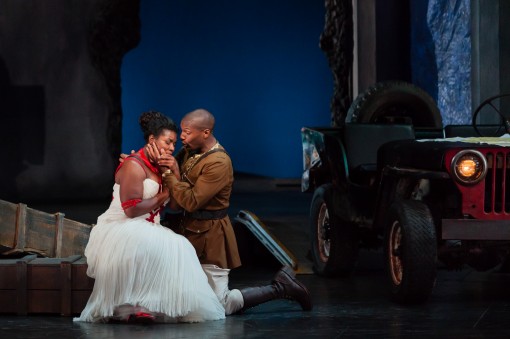A fine “Aida” cast gets water-boarded by clumsy staging at Glimmerglass

Michelle Johnson and Noah Stewart star in Verdi's "Aida" at Glimmerglass. Photo: Karli Cadel/Glimmerglass Festival
Nestled on the idyllic shores of New York’s picturesque Otsego Lake, between the Adirondack and Catskill Mountains and just north of Cooperstown, is the home of the Glimmerglass Festival. With a relatively brief but distinguished 20-year history, this summer festival came under the artistic direction of the American opera director Francesca Zambello in 2010. She opened her second season, quite ambitiously, with Verdi’s Aida, the grandest of grand operas.
For all of the pageantry with which it has been memorably staged over the years, Aida can actually work in a small-scale production, without all of the elephantine hoopla, provided it has excellent singers in the four lead roles. On that front, this production, heard Friday night, certainly delivers, bringing together two rising African-American singers with a more established one — bass-baritone Eric Owens, who serves as the season’s Artist in Residence.
Soprano Michelle Johnson, who hails from Texas, won the Grand Prize at the Met Council Auditions last year, and possesses almost the complete vocal arsenal needed for the title role. Her chest voice was particularly effective, giving powerful emotional intensity to her sound. The top had gusto when it needed it, with only her high pianissimos lacking some luster, with the invocations of Numi, pietà, for example, not as resplendent as they could be. Johnson was reportedly put on vocal rest at the start of the run, replaced by Adina Aaron for the first three performances, but she is now back in the title role, with some traces of either fatigue or discomfort.
The prize for extraordinary volume went to mezzo-soprano Daveda Karanas, another Met Council winner, with a searing top that tended slightly toward shrillness, but in a way that was exciting and quite appropriate for the role. Eric Owens brought gravity and dignity to the role of Amonasro, Aida’s imprisoned father, with blazing strength on the high notes, even after having sung a concert of music by Billy Eckstine earlier in the afternoon.
What a shame, then, that Zambello’s staging made such a hash of the story. She has updated the action from the time of the pharaohs in Egypt to an unspecified Muslim country in the recent past. The intention of such updating is to make the story more relevant to a modern viewer, but it was impossible to place the staging in any context that made sense in the modern world. Muslims worshiping Ptah and other gods, led by a woman muezzin? The single set, designed by Lee Savage, seemed to evoke a bombed-out palace in Iraq or Afghanistan, but Bibhu Mohapatra’s costumes featured neither hijab nor burqa for the women. The primary intention of this clumsy setting was for the director to transform the trial scene into a water-boarding session for Radamès. Oddly, in the subsequent tomb scene, he and Aida die from lethal injections, which, as everyone knows, is the form of execution favored by Muslim dictators.
In fact, the only thing Egyptian about this Aida was the conductor, Nader Abbassi, principal conductor of the Cairo Opera Orchestra. With impeccably precise gestures, he navigated pliable tempi for the singers, erring only on the side of too much sound at times. The same enthusiasm made the tutti moments, with all of the soloists and a crackerjack chorus, admirably prepared by David Moody, blasting away at full bore, shake the rafters. The playing in the pit ranged from rather good (the oboe solo in O patria mia) to slightly shabby, especially in the strings.
Morale in the pit may be low, as renegotiation of the orchestra’s contract came down to the wire last month, potentially endangering the season. It does not help that David Angus resigned as music director at Glimmerglass last year, a position that has yet to be filled. In response to a query about how the situation was resolved, a company spokeswoman said “Both parties are currently operating under the current contract, and we continue to negotiate in good faith until an agreement is reached.”
Aida runs through August 25. Glimmerglass Festival.
Posted Aug 13, 2012 at 1:28 pm by Theodore Lang
In 60 years of enjoying opera and learning more each time I experience it ( OPERA), I have become an ardent tradisionalist.
This performance’s staging was so repugnant and if it was intended to get a younger audience involved, it would if they were RED NECK MEMBERS OF THE NRA and the director was George W. Bush.
Posted Aug 18, 2012 at 10:37 am by DANIEL CARNO
I suppose I can be labeled a reformed traditionalist.
I don’t automatically reject productions because the original setting has been altered, but I do insist that two requirements be addressed: both the music and the drama must be well served in a balanced partnership. This production certainly succeeded on all counts (August 11). Every gesture and movement enhanced what I was hearing. Thanks to some very alert, sensitive conducting, the music propelled the action on stage. I was thoroughly engaged, as was, obviously, the entire cast (another plus).
Too many productions of this opera fall from their own weight, filling the stage with “authentic” paraphernalia that leaves no room for the very essential drama in the story. The very high energy level that resulted from this paring down, suggests that there is more story than pageantry to be had in Aida.
Dan Carno